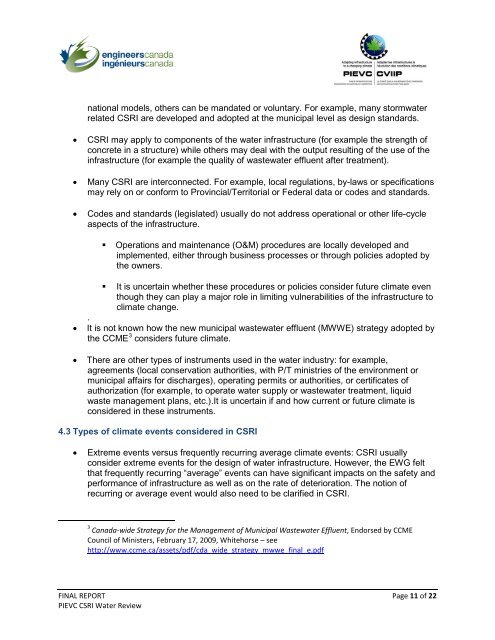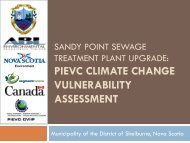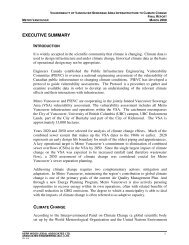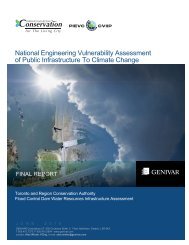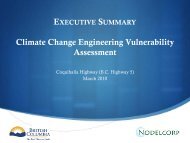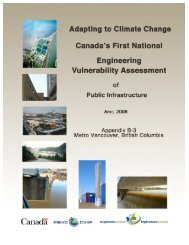Codes, Standards and Related Instruments (CSRI) - Vulnerability ...
Codes, Standards and Related Instruments (CSRI) - Vulnerability ...
Codes, Standards and Related Instruments (CSRI) - Vulnerability ...
You also want an ePaper? Increase the reach of your titles
YUMPU automatically turns print PDFs into web optimized ePapers that Google loves.
national models, others can be m<strong>and</strong>ated or voluntary. For example, many stormwaterrelated <strong>CSRI</strong> are developed <strong>and</strong> adopted at the municipal level as design st<strong>and</strong>ards.• <strong>CSRI</strong> may apply to components of the water infrastructure (for example the strength ofconcrete in a structure) while others may deal with the output resulting of the use of theinfrastructure (for example the quality of wastewater effluent after treatment).• Many <strong>CSRI</strong> are interconnected. For example, local regulations, by-laws or specificationsmay rely on or conform to Provincial/Territorial or Federal data or codes <strong>and</strong> st<strong>and</strong>ards.• <strong>Codes</strong> <strong>and</strong> st<strong>and</strong>ards (legislated) usually do not address operational or other life-cycleaspects of the infrastructure.• Operations <strong>and</strong> maintenance (O&M) procedures are locally developed <strong>and</strong>implemented, either through business processes or through policies adopted bythe owners.• It is uncertain whether these procedures or policies consider future climate eventhough they can play a major role in limiting vulnerabilities of the infrastructure toclimate change..• It is not known how the new municipal wastewater effluent (MWWE) strategy adopted bythe CCME 3 considers future climate.• There are other types of instruments used in the water industry: for example,agreements (local conservation authorities, with P/T ministries of the environment ormunicipal affairs for discharges), operating permits or authorities, or certificates ofauthorization (for example, to operate water supply or wastewater treatment, liquidwaste management plans, etc.).It is uncertain if <strong>and</strong> how current or future climate isconsidered in these instruments.4.3 Types of climate events considered in <strong>CSRI</strong>• Extreme events versus frequently recurring average climate events: <strong>CSRI</strong> usuallyconsider extreme events for the design of water infrastructure. However, the EWG feltthat frequently recurring “average” events can have significant impacts on the safety <strong>and</strong>performance of infrastructure as well as on the rate of deterioration. The notion ofrecurring or average event would also need to be clarified in <strong>CSRI</strong>.3 Canada-wide Strategy for the Management of Municipal Wastewater Effluent, Endorsed by CCMECouncil of Ministers, February 17, 2009, Whitehorse – seehttp://www.ccme.ca/assets/pdf/cda_wide_strategy_mwwe_final_e.pdfFINAL REPORT Page 11 of 22PIEVC <strong>CSRI</strong> Water Review


